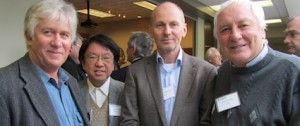
The new LCC directorate: Mike Harrison, ILC Director; Hitoshi Yamamoto, Detector Director, Steinar Stapnes, CLIC Director, and Lyn Evans. Hitoshi Murayama (not pictured) is Deputy Director. Image: LCC
Let me take this opportunity to acknowledge the enormous achievement of the very small GDE team, led by Barry Barish. They have produced the Technical Design Report, which has been favourably reviewed by an independent expert committee. The TDR also contains a detailed cost estimate which has also been independently reviewed and has proved to be robust – see Barry’s Corner for more detail on the cost review. I would also like to acknowledge the work of the physics and detector community, led by Sakue Yamada. They are in the process of finalising the Detailed Baseline Design (DBD) report.
The mandate of the LCC is strongly supported by the recent update of the proposed European Strategy for Particle Physics (still to be endorsed by the CERN Council). For CLIC, “CERN should undertake design studies for accelerator projects in a global context, with emphasis on proton-proton and electron-positron high-energy frontier machines. These design studies should be coupled to a vigorous accelerator R&D programme, including high-field magnets and high-gradient accelerating structures, in collaboration with national institutes, laboratories and universities worldwide.”
For ILC, “There is a strong scientific case for an electron-positron collider, complementary to the LHC, that can study the properties of the Higgs boson and other particles with unprecedented precision and whose energy can be upgraded. The Technical Design Report of the International Linear Collider (ILC) has been completed with large European participation. The initiative of the Japanese particle physics community to host the ILC in Japan is most welcome, and European groups are eager to participate. Europe looks forward to a proposal from Japan to discuss a possible participation”. The next step in developing a world consensus is the “Snowmass” process which is now underway. Hopefully the result of these discussions will lend as strong support to the ILC from the US HEP community as has been shown by the European Strategy Group.
The new structure of the LCC Directorate is very light. Hitoshi Murayama will be my deputy, who will mainly be responsible for explaining the scientific case for the ILC to governments and the public. Steinar Stapnes will continue in his role as Director of the CLIC effort and Mike Harrison will take over the ILC. Hitoshi Yamamoto, as Detector Director, will take on the difficult task of bringing the experimental community together so that they are capable of building two state-of-the-art detectors. Regional representation and coordination will be strengthened by appointing regional members (of the directorate?) for Europe and the Americas. For the moment it is considered that the representation from Japan is adequate and regional advice will be sought case by case as the ILC project develops.
The GDE has left the ILC in very good shape. Although continuing R&D is still needed to try to further reduce the cost and to and prepare for a possible construction project, the main thrust of the effort must now move to a diplomatic campaign to convince governments to participate in the construction of a first-rate laboratory that will further the world’s efforts in understanding the fundamental nature of matter.


Recent Comments